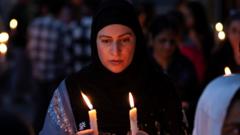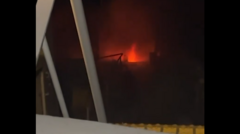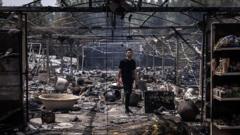Israel's recent military strikes near a Syrian presidential palace underscore the mounting sectarian violence threatening the Druze minority.
**Escalating Tensions: Israel Targets Syria Amid Druze Violence**

**Escalating Tensions: Israel Targets Syria Amid Druze Violence**
Israel's military action highlights growing unrest over the sectarian conflict involving the Druze community.
Israel has escalated its military operations in Syria, conducting airstrikes near the presidential palace in Damascus as violence against the Druze community rises. Prime Minister Benjamin Netanyahu reaffirmed commitments to protect the Druze, stating that the strike served as a "clear message to the Syrian regime" regarding Israel's stance on troop deployments threatening the community.
The assault followed clashes that erupted between Druze gunmen and Sunni Islamist fighters, resulting in significant casualties. Israeli officials noted they acted to defend the Druze, with reports indicating that upwards of 102 individuals have been killed in the recent turmoil across Druze-populated areas like Ashrafiyat Sahnaya and Suweida. The violence reportedly began when an offensive audio clip circulated, igniting tensions between Sunni Muslims and the Druze.
Sheikh Hikmat al-Hijri, the Druze spiritual leader, condemned the attacks as genocidal. The Syrian government has countered these claims by asserting that it is deploying security forces to restore order in Druze areas, warning that calls for international intervention may worsen the situation. In a culturally rich yet politically fraught landscape, the Druze, who represent about 3% of Syria's population, are seeking increased protections amid fears of targeted government actions.
Despite pledges from transitional President Ahmed al-Sharaa to protect various minorities, fear remains high due to the history of violence against the Druze and other minority groups during the Syrian civil war. Netanyahu has warned of potential threats from security forces linked to the prior Assad regime, expressing Israel's concern about the influence of groups like Hayat Tahrir al-Sham (HTS).
Israel’s involvement includes not only strikes but a series of military operations targeting Iranian assets in Syria over the past few months, emphasizing its strategic imperative to maintain regional stability, especially in light of the ongoing sectarian conflicts.
The assault followed clashes that erupted between Druze gunmen and Sunni Islamist fighters, resulting in significant casualties. Israeli officials noted they acted to defend the Druze, with reports indicating that upwards of 102 individuals have been killed in the recent turmoil across Druze-populated areas like Ashrafiyat Sahnaya and Suweida. The violence reportedly began when an offensive audio clip circulated, igniting tensions between Sunni Muslims and the Druze.
Sheikh Hikmat al-Hijri, the Druze spiritual leader, condemned the attacks as genocidal. The Syrian government has countered these claims by asserting that it is deploying security forces to restore order in Druze areas, warning that calls for international intervention may worsen the situation. In a culturally rich yet politically fraught landscape, the Druze, who represent about 3% of Syria's population, are seeking increased protections amid fears of targeted government actions.
Despite pledges from transitional President Ahmed al-Sharaa to protect various minorities, fear remains high due to the history of violence against the Druze and other minority groups during the Syrian civil war. Netanyahu has warned of potential threats from security forces linked to the prior Assad regime, expressing Israel's concern about the influence of groups like Hayat Tahrir al-Sham (HTS).
Israel’s involvement includes not only strikes but a series of military operations targeting Iranian assets in Syria over the past few months, emphasizing its strategic imperative to maintain regional stability, especially in light of the ongoing sectarian conflicts.



















